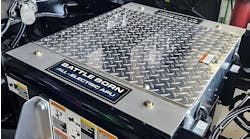Some budget proposals may come back to haunt carriers
The President sends Congress his budget around Groundhog Day. That's fitting, because when Congress is controlled by the opposite party it likes to declare the budget "dead on delivery" and put it underground for a long sleep. But such reports of budgetary demise are usually premature. The revenue raising recommendations have a nasty habit of rising from their early graves months later, around Halloween. That's when Congress finally passes a tax bill the President is willing to sign, but also digs up some previously buried treasure to offset the cost.
Let's look at the 1999 tax bill. After proclaiming the President's proposals too chintzy and passing a huge tax cut that was vetoed, Congress wound up passing one of the smallest tax trims in years. Congress shrank the cost further by eliminating the tax deferral on many installment sales. That was an Administration proposal which small businesses, tax advisers and lobbyists (including those representing carriers) ignored at the time but are howling about now.
That's why the phonebook-length list of tax proposals tucked into President Clinton's final budget is worth the eyestrain. For instance, lurking on page 201 of the Treasury Dept.'s catchily named "General Explanations of the Administration's Fiscal Year 2001 Revenue Proposals" (www.ustreas.gov/taxpolicy/library/grnbk00.pdf) is this goblin: "eliminate installment payment of heavy vehicle use tax" (HVUT).
Truckers have long had the option of making quarterly payments for the HVUT (which runs up to $550 on combinations registered at more than 75,000 lb.). The first installment for the July 1-June 30 taxable year is due August 31. To enforce the tax, the federal government requires states to see proof of payment before they can register a vehicle for the coming year.
But an unknown number of truck owners pay only the first quarterly installment, receive their registration, and then head out on that lonesome highway for the rest of the tax year. The following year they repeat the procedure. Hence the proposal in this year's budget to require full payment, beginning in August 2001.
Unlike most of the Administration's revenue raisers, this one is new and may have appeal in Congress. First, the burden would fall mainly on tax evaders. Compliant taxpayers would have to come up with a few hundred dollars a few months sooner than under current law, but would not face an actual increase.
Second, taxpayers and the IRS would experience savings in paperwork from the elimination of three quarterly returns. (But buyers of trucks placed in service after June each year would still file returns for those quarters).
Third, the money would go into the Highway Trust Fund. That aspect may win some votes among members of Congress who would be less sympathetic if the money went to the general fund. This year the trust fund is flush with money, partly because roaring new-truck sales have generated millions of extra dollars from the HVUT and from the 12% excise tax on new tractors, trucks, and trailers. In fact, another part of the budget has provoked a fight over how to spend a fistful of dollars - some $3 billion - in unanticipated trust fund revenue. Nevertheless, there are plenty of members who hanker for a few dollars more.
The bottom line: Congress loves to bad-mouth budget proposals and pass grandiose tax cuts. But if members want to campaign on the basis of laws that have actually been signed, they'll have to turn to the hard work of paying for some of the treats. That's why taxpayers who want to avoid losing sleep at tax time next year can benefit from doing a little heavy reading, and perhaps some lobbying, right now.


